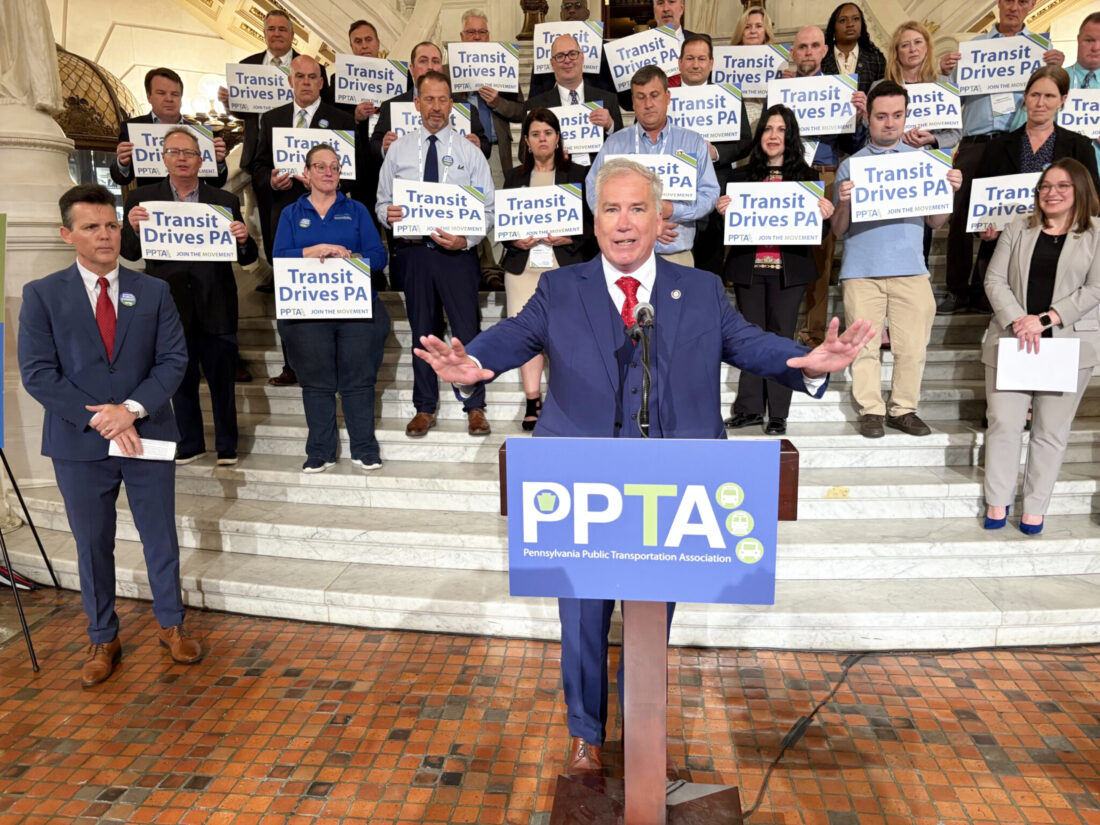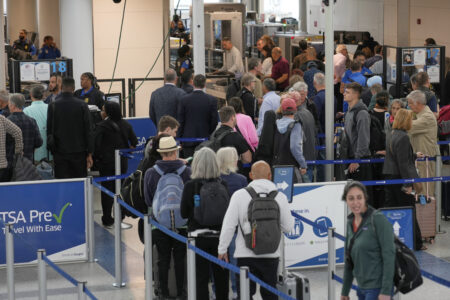With public transit agencies in dire straits, Pa. House puts Shapiro’s funding plan into play

Peter Hall/Capital-Star Pennsylvania House Transportation Committee Chairperson Ed Neilson (D-Philadelphia) speaks at a rally with public transportation agency executives on Monday, May 5.
As the commonwealth’s two largest public transportation systems barrel toward fiscal crises and sweeping service cuts, Pennsylvania lawmakers approved legislation Monday to direct nearly $300 million in new funding to transit agencies in the next state budget.
The bill reflects Democratic Gov. Josh Shapiro’s budget proposal to provide the first increase in the state’s contribution to mass transit in over a decade. It would increase the share of state sales tax revenue dedicated to transit by 1.75% to provide an additional $1.5 billion for transit over the next five years.
The Southeastern Pennsylvania Transportation Authority (SEPTA), which operates bus and rail service in the Philadelphia region, and Pittsburgh Rapid Transit (PRT), have both announced that without the state’s help to close budget deficits, they will have no choice but to drastically cut service starting this summer.
During a rally with transit executives Monday at the state Capitol, Lt. Gov. Austin Davis said he recently rode along with his father, a PRT bus driver and saw firsthand that public transit is vital to workers, students, people with disabilities and seniors.
“We can’t leave these folks standing along the roadside waiting for a bus that never comes because we failed to act here in Harrisburg. That would be bad for the people of Pennsylvania. It would be bad for business here in Pennsylvania,” Davis said, citing a claim by the American Public Transportation Association that every dollar spent on public transportation generates $5 in economic activity.
Shapiro also pushed for more transit funding last session, and though the plan won bipartisan support in the House, it was not considered in the GOP-controlled Senate. Republican leaders in both chambers have steadfastly opposed the increase, saying it is unsustainable and called for alternative funding sources, reforms and privatization.
In a statement, Senate Majority Leader Joe Pittman (R-Indiana) said while he recognizes the importance of transit to the state’s economy, taxpayers should have assurance that the billions the state spends provides safe, reliable and efficient transportation. He also said GOP lawmakers want similar investments in highways and other modes of transportation that serve rural communities.
Reintroduced this session as House Bill 1364, the legislation passed 16-10 Monday in the House Transportation Committee. It now heads to the full House for a vote. Republican Reps. Shelby Labs and Kathleen Tomlinson, who represent parts of the Philadelphia suburbs with SEPTA service in Bucks County, broke ranks to vote in favor of the bill.
At the rally, Transportation Committee Chairperson Ed Neilson (D-Philadelphia) expressed frustration at the Senate’s inaction last session.
“We showed today … that transportation and transit funding is a bipartisan issue,” Neilson said.
He added that transit is too important and the need is too urgent to wait for other sources of revenue that have been proposed, such as the taxation of so-called skill games and recreational marijuana legalization, both of which Shapiro’s budget includes.
“We can’t gamble for transit. We can’t wait for somebody to fix the gaming machines or somebody to do marijuana … these agencies needed money yesterday, not tomorrow,” Neilson said.
Facing a $213 million deficit in July, SEPTA is planning to eliminate 50 bus routes, five regional rail lines, one metro line and reduce or modify more than a dozen other services. It would also raise fares 20%. PRT has a $100 million shortfall and plans a 35% service reduction and a 9% fare increase.
Both agencies say there’s nothing left to cut but service.
Rep. Kerry Benninghoff (R-Centre), the ranking Republican transportation committee member, asked during Monday’s committee meeting whether the additional transit funding would be offset by reductions in other spending.
Committee Executive Director Kyle Wagonseller said the additional money would come from year over year increases in sales tax collection. The 6% tax on most goods and services purchased in Pennsylvania generated about $340 million more in 2024 than in 2023, Wagonseller said.
Benninghoff told the Capital-Star after the meeting that he wasn’t satisfied with the answer. He noted the transit funding legislation increases the percentage of sales tax dedicated to transit, rather than a set amount, leaving a smaller percentage of the revenue available for other uses..
“Somebody’s ox is getting gored. It’s not extra money sitting around,” Benninghoof said.
In addition to the sales tax reallocation, House and Senate lawmakers have proposed generating additional transit funding by raising the state’s rental car fee from $2 to $6.50, car lease fee from 3% to 5%, and establishing a 6% excise tax on ride-hailing services like Uber and Lyft.
“These small increases add up to big investments,” said Sen. Lindsay Williams (D-Allegheny), who is also a PRT board member and a sponsor of the “Transit Funding for All” package. “It means that our most vulnerable neighbors can have meaningful, dignified lives and continue to live independently through public transit and access ride services.”
——
Pennsylvania Capital-Star is part of States Newsroom, a network of news bureaus supported by grants and a coalition of donors as a 501c(3) public charity. Pennsylvania Capital-Star maintains editorial independence. Contact Editor Tim Lambert for questions: info@penncapital-star.com. Follow Pennsylvania Capital-Star on Facebook and Twitter.





